The championship returns to London for the first time since 2015 and what some of 2023’s competitors saw at Lee Valley White Water Centre in the 2012 London Olympics was the inspiration for them to pick up a paddle for the first time.

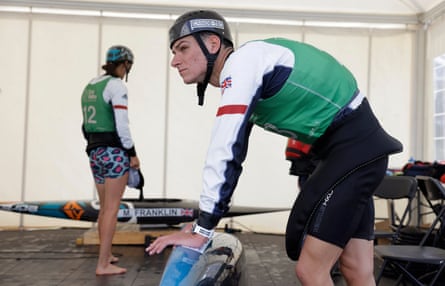
Tadeusz Kuchno of Poland battles with Ondrej Tunka of the Czech Republic as they practise kayak cross technique on the Legacy Loop during the final day of practice (top) Jonny Dickson of Great Britain waits to weigh his boat at boat (above). Lea Baldoni of Canada in action and Iris Sommernes of Norway gets into trouble getting through a gate on the Olympic Course during the final day of practice (below).
Amir Rezanejad Hassanjani, originally from Iran, is competing here with the hope he will get to the Paris Olympics. If he doesn’t qualify outright then the International Canoe Federation may apply to the IOC for him to compete there as a refugee.
Rezanejad started competing for Iran in 2015, and even represented his country at the 2017 ICF World Championships. But he knew it could never last. Three years ago, in pursuit of a safer life, he fled the country of his birth and walked for 16 days and nights through the mountains which border Iran and Turkey. Eventually he made his way to Germany where he now lives and trains.
“Since last year everyone around the world knows the situation in Iran, how the government was treating all the people, even the athletes. That happened to me three years ago, I had to leave my country and I didn’t have the chance to stay.”
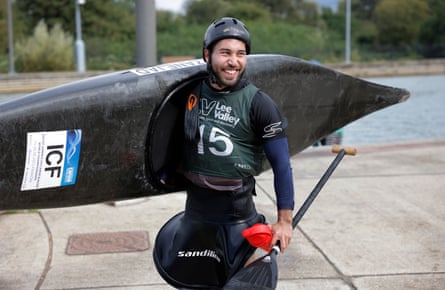
He thought his career in the sport he loved would stop when he left Iran. “I wasn’t expecting to start again. Three years ago I thought my career would stop and I would have to do something else.” Six months ago he was told by the ICF that they wanted him to compete again this year as a refugee athlete. “It was another chance and very emotional for me.
“I was ten years old when I saw the Olympic Games in London. That was like a dream. When I got the email inviting me to compete here, I was crying. It was a dream again. All my family are still in Iran but they know what I’m doing this week.”
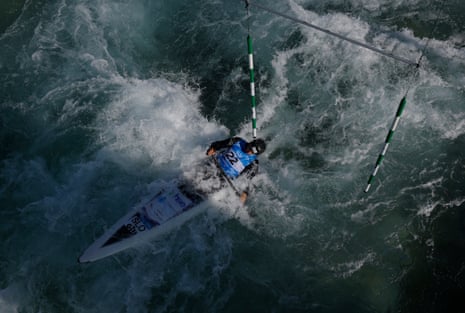
Alja Kozorog of Slovenia taking part in the women’s canoe semi-final.
Another competitor inspired by the London Olympics was 22-year-old GB canoe slalom athlete James Kettle. It was his birthday on the opening day when he won silver in the canoe teams event, his first senior world championship medal.
In 2012 he lived a 15-minute drive away from course and started paddling there when the venue was built and went with his father Paul and brother William to the Olympics, saw Etienne Stott and Tim Baillie win Britain’s first ever canoe slalom gold medal, and was inspired to take up the sport.
“Before 2012 I didn’t know much about slalom. I came along to the Olympics, a huge event on my doorstep. I was here when the C2 won gold and silver, it was amazing. That day had a real impact on me and my love for the sport. Soon after I joined a club here and from there gradually worked my way up. Now this, to be on the podium myself winning a medal, it’s a dream come true.”

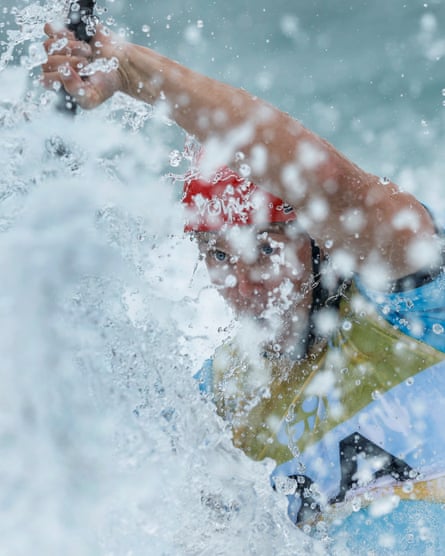
After winning her second gold medal of these championships in the C1, Mallory Franklin said: “It’s really cool, especially in front of a home crowd, it’s amazing to come away with gold.”
Asked about the 2024 Olympics she replied: “It’s really exciting, it’s just round the corner. I’ve been over to Paris a lot and I love it. It’s really cool to be at this level so close to the Games. Hopefully it stays that way but we’ll keep pushing on to Paris.”
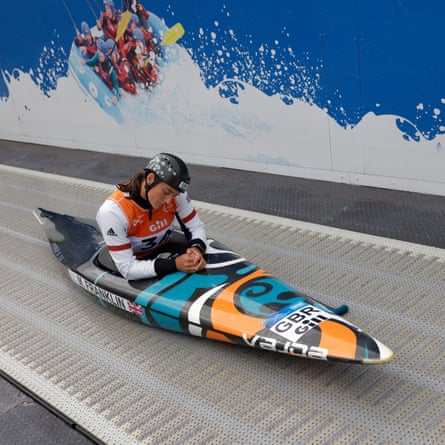
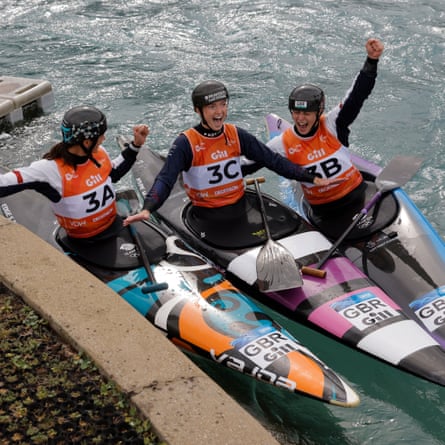
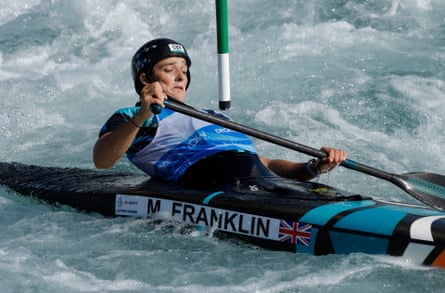
Mallory Franklin deep in thought as she takes the elevator up to the top of the course before competing in the women’s canoe team event and with Ellis Miller and Kimberley Woods as they realise they have won gold (top). Franklin narrowly avoids hitting a gate on her way to the gold medal in the women’s canoe final.
She has been around the senior GB canoe team since 2009. “I came here [Lee Valley] when it first opened and I’ve been paddling here for 13 years now. It’s an amazing venue that the Games gave us. We’ve been based here and trained here ever since. Having access to a venue like this and the set up we’ve got, it’s just world class. You can really see it in the quality of the paddlers we have and the strength in depth. As a team we are in a strong place right now.”
On the Olympic course at Lee Valley, she added: “Here is consistently hard, the water is bigger and bouncier and tougher physically than anywhere else. I love training here, it’s the best venue in the world. For us it’s great to be able to show this week what we can do in front of a home crowd.”

Monica Doria Vilarrubla of Andorra crosses the finish line in the women’s canoe final.
Competing at Lee Valley was Australia’s Jessica Fox who is the most successful female slalom paddler ever, with (prior to the event) nine individual world title gold medals and 14 individual medals overall. In Lee Valley she contested five events – C1, K1, kayak cross and canoe and kayak team events. In addition to these titles she has won 38 World Cup gold medals and four Olympic medals.

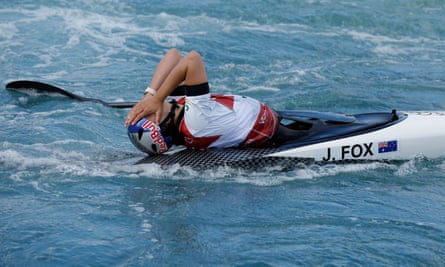


Jessica Fox of Australia on her way to winning gold in the women’s kayak K1 final, celebrates her victory, gives an interview in the “kiss and cry” tent and signs an autograph for fans.
“It meant a lot, there’s been such a big build up this week, and 2018 was my last world title, and there was a lot of emotion because that run was full of emotion. I let it all out at the finish, all the joy, all the emotion,” Fox said. “I’m always pleased to be battling it out with the best, and to be consistently up there and be on the podium. This one is [individual] world title number 10, which is a really special one. I’ve been chasing this one for a long time and it just means so much to me.”

A judge looks on as Lucas Rossi of Argentina is reflected in a mirror by the big drop during the men’s kayak team event.
Another Olympic medallist competing at the championship was Joe Clarke, who won K1 gold at Rio in 2016, seen below celebrating after triumphing in the men’s kayak final to win his first ever individual K1 world title. It almost certainly guaranteed that he will return to the Olympics in Paris. “That celebration’s not just for today, it’s for the emotion over the last seven years since winning that gold in Rio. I’ve been knocking on the door for that world title so finally to take that title at home, with all my family and friends here, means so, so much. It’s hard to put into words.”

Clarke wasn’t selected for the Tokyo Olympics. “I missed out on Tokyo, it was a tough pill to swallow. Tough times don’t last but tough people do so here I am. Having messed up when the 2015 Worlds were here, I had some demons to really fight today. This is a redemption story and that’s how it panned out. It’s all down to belief. I believed in myself the whole time even when I was at the lowest low.”
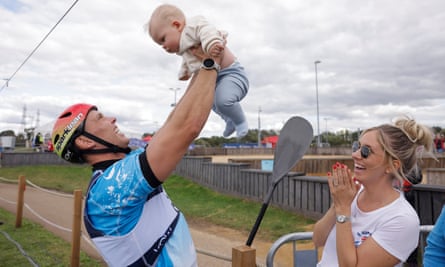
Joe Clarke of Great Britain celebrates with his son Hugo and wife Belle after winning gold in the men’s K1 kayak final. Twenty-four hours later Clarke was back on the podium after winning the men’s kayak cross final.
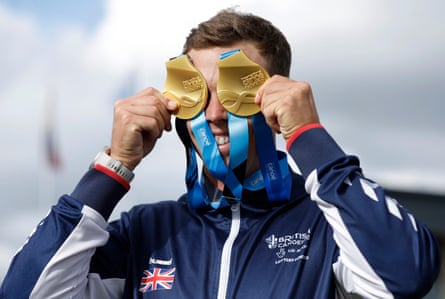
He added: “Things are now going from strength to strength and hopefully it all comes together in Paris next year. I know exactly what I’m doing, I can’t give away the secrets.” Asked if being a father has helped, Clarke said: “Maybe it’s dad strength, dad power. Every training session I think of my wife and son, they have sacrificed so much for me to be here.” On the left side of his waterproof top that he always wears when competing are two imprints of the hands of his son, Hugo. “Those hand prints are over my heart, he’s with me all the time on the course. He’s obviously bringing me good luck.”
Kayak cross, previously known as extreme slalom, will be making its Olympic debut next summer. The category first appeared on the ICF’s World Cup program in 2015, and since then the growth has been phenomenal. Athlete numbers have been increasing every season, and more TV networks are showing the races live. Many of the British team have already enjoyed great success in the new discipline, with Joe Clarke winning back-to-back world titles in 2021 and 2022 and Mallory Franklin winning European silver last year. It is a combination of all canoeing’s white water disciplines, with competitors racing in identical plastic creek boats. The excitement begins from the very start, with four competitors sliding off a ramp more than two metres above the water and splashing onto the course as one.
From there it’s a race to the first gate buoy, and it really is a case of anything goes as each paddler tries to steal an advantage over their opponents. Athletes need to negotiate both downstream and upstream gate buoys, and contact is allowed – adding to the thrills and spills and excitement for spectators and athletes alike.



Kimberley Woods of Great Britain celebrates as she crosses the line in the final of the women’s kayak cross, an emotional Woods with runner-up Camille Prigent of France as she celebrates winning her fourth medal of the championship, Woods shows off her haul of two golds, one silver and one bronze.
A big crowd was on hand at the 2012 Olympic venue to lift the British paddlers Kimberley Woods and Joe Clarke to double kayak cross gold on the final day of the championship and to cement Great Britain’s place at the top of the medal table, picking up five golds, two silvers and a bronze medal. Australia, with two golds and a bronze, were second, while France had one gold and four silvers.
